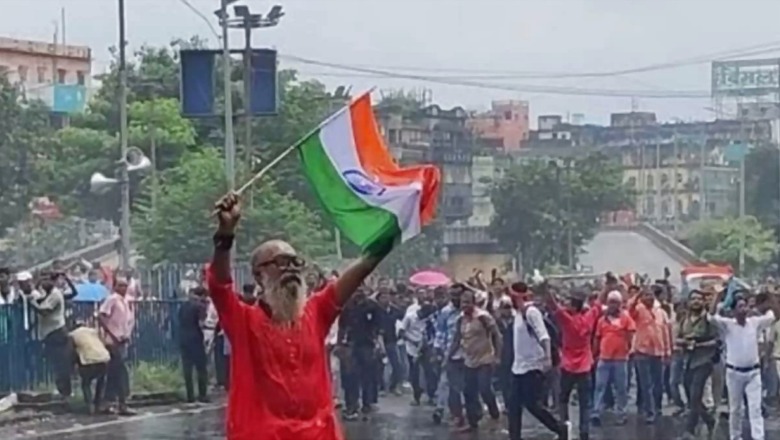
views
In the recent past, the year-long farmers’ protest that forced the Centre to withdraw three controversial laws had one such moment when an armed police guard was seen with a wooden stick about to hit an old protesting farmer. According to Reuters, it represents the year-long agitation and its ethos.
When a brave girl tied her hijab to a stick and stood up in protest against the death of 22-year-old Mehsa Amini in Iran in 2022, she became the face of hundreds and thousands of brave women of Iran. If one rewinds to 1989, Jeff Widener captured one of the most iconic photos of any protest across the globe — the Tank Man who faced a series of tanks in China’s Tiananmen Square where protestors were occupying the area.
If the rape and murder of a 31-year-old trainee doctor at Kolkata’s RG Kar Hospital that sparked off a massive nationwide protest needed one such moment, they have got it, finally.
THE MOMENT
A man standing up to the turbo speed of the water cannon released to disperse the crowd in Kolkata during a march towards the state secretariat — waving a tricolour, turned out to be that image that seemed to represent the ethos of the protest that has now gone much beyond the participation of doctors.
Neither the girl with the hijab in a stick, the farmer who was about to be beaten nor the man with a bag full of groceries in one hand standing up to a moving tank made them iconic. The society did. Similarly, Balaram Bose, who is now called Kolkata’s Tiananmen man didn’t have to make it viral. The online world has done it. Cartoons are made, memes are created, and his GIF files are unleashed where they are shared rapidly and widely.
“I wanted to convey our message to Nabanno (state secretariat). If I would have died, so be it,” said the man who unintentionally has become the face of this agitation. He insists he is one among the thousands who took to the streets that day. “Some want to portray me as a villain, some as a hero. Let me tell you, I am just a common man — one among the thousands,” said Bose.
SAFFRON SYMBOLISM
Wearing a garland of rudraksha, sporting a saffron dress, and holding India’s national flag — the symbolism was hard to miss. He described himself as a ‘sanatani’, an ardent follower of Shri Aurobindo Ghosh, a nationalist who fought against the British Raj and later turned into a yogi. These saffron and nationalistic symbolism are generally associated with the BJP, which made TMC MP Sagarika Ghosh call him a BJP member. But he rubbished all such claims and said he wears what a ‘sanyasi’ wears.
The people rise against tyranny… pic.twitter.com/DU3RGqF0GK— Smriti Z Irani (@smritiirani) August 27, 2024
But the saffron ecosystem is loving Balaram Bose’s defiance turning out to be a moment that represents one of the most organic protests against the Mamata Banerjee government. No wonder former union Minister Smriti Irani shared Bose’s defiance calling it people’s “rise” against “tyranny” or Vishwa Hindu Parishad’s Sourish Mukherjee sharing his grab while saluting his “courage” “at this age”.
The “moral responsibility” to “disobey” unjust laws that Martin Luther King Junior stressed about during America’s Civil Rights movement seems to resonate in Balaram Bose’s call not to let this protest die down, come what may. Balaram Bose calls the high-handedness of the police their “slavery” which he calls to “break” and “join” the protestors. Probably, so that, he doesn’t have to be a lone man standing in front of water cannon like 19-year-old archaeology student Wang Weilin had to stand alone at Tiananmen Square, next time.
















Comments
0 comment